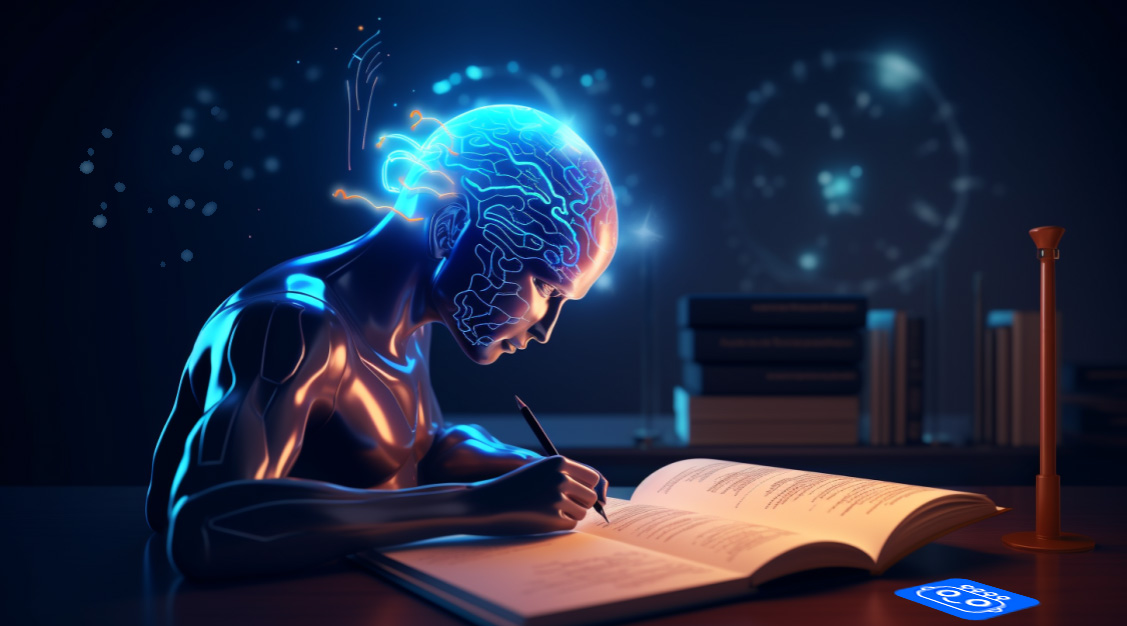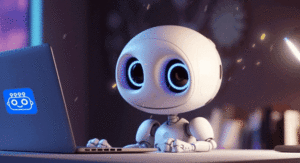The tech sphere is a-humming these days, and I’m not just talking about your run-of-the-mill buzz. The core question that’s really sparked a heated debate is this: “Will AI replace writers?”
As a person who finds more comfort in scribbling on a notepad than tinkering with code, this question has got my gears grinding. It’s got me wondering, and maybe a smidge worried, too.
But hold your horses, let’s get into the nitty-gritty before I start having nightmares about a job interview with an AI boss!

Try these new AI-powered tools:
- 5 Best AI Detectors To Unmask AI-Written Content With Accuracy
- 5 Best AI Writers To Boost Your Productivity And Content Quality.
- This "Secret AI Writer" Can Bypass AI Detection Like A Pro.
So, what’s the intel on the market and demand for AI writing?
A report by the brains at Growth Market Reports forecasts that the AI Writing Assistant Software market, kicking off at a cool $469.2 million in 2022, is about to hop, skip and jump to an eye-watering $1.550 billion by 2031. We’re talking a jaw-dropping 14.2% compound annual growth rate (CAGR).
With the demand for AI in writing heading for the stars, it looks like AI’s on its way to penning a blockbuster in the market!
No surprise, then, that writers all over the globe are up at night, fretting over the idea of their jobs doing a cha-cha straight to the unemployment line.
Article At-A-Glance
-
- The rise of AI technology in the world of writing paints an amazing transformation. We’re seeing it morph from a basic tool to a crucial partner for cooking up top-tier content.
- Armed with a boatload of data know-how and swanky tricks like Natural Language Processing (NLP), these systems can whip up a smorgasbord of text-based pieces.
- Despite some pretty major strides in AI tech, it still can’t match the intricate and emotional depth shown by us human writers. Human writers have got certain qualities you just can’t bottle.
- Even with all the progress in machine learning and AI, tasks involving NLP skills, expressing emotions or experiences, are still a tough nut for AI systems to crack.
Table Of Contents
Are AI Writing Tools Mightier Than The Pen?
Tech’s a stampeding stallion, right? It’s charging forward at a breakneck speed, and now it’s trying its hand at being a word slinger. AI writing tools have gone from being handy helpers to full-blown right-hand men, helping us keep the content creation machine churning.
Will AI Replace Writers Soon?
Generative AI is kind of like a buffet-style AI, dishing out all sorts of treats – text, images, audio, and even synthetic data. How’s it doing that, you wonder? Well, it’s chowing down on humongous data sets, belching out what it reckons is the best result. And let me tell you, it’s getting darn good at it!
Imagine this: a bot chomping through piles of written texts, dissecting and deciphering them using something fancy like Natural Language Processing (NLP). Then, like a master craftsman, it serves up fresh pieces, echoing the style and tone of its ‘training sets’. Clever little devil, isn’t it?
On top of that, these brainy bots are upping their game, kudos to the newest widgets and flash models like Long Short-Term Memory (LSTM) networks. So, they’re getting the hang of distinguishing similar words in context, something we humans do in our sleep.
While these AI helpers are ace at saving you time and dosh, there’s a twist. They ain’t exactly bagging any Pulitzers. Their work, while passable, doesn’t pack the same punch or pull at the heartstrings like ours does. After all, they lack the magic ingredient we humans bring to the table – consciousness.
The Handy-Dandy AI Sidekick
AI’s turning out to be a reliable right-hand man in the world of content creation. Picture it as a tireless intern, always on the ball, ready to pull up, research, and summarize info for us. It’s like having your very own personal assistant, at your beck and call.
But there’s more!
AI’s also dabbling in the editing and proofreading game, picking out grammar gaffes and suggesting zippier wording or synonyms. It’s like having your English prof on standby but without the furrowed brow.
AI-powered SEO writing tools have also hopped aboard, vowing to give your Google rankings a leg up. So, it’s plain to see that AI’s carving out a pretty nifty role in the writing realm.
Now, don’t get ahead of yourself thinking these bots are all set to nab our jobs. They’re missing one vital piece: the human factor.
The imaginative sparks and emotional bonds that make writing a heart-tugging affair? Robots ain’t got that in their toolkit just yet.
They simply don’t have our one-of-a-kind human mojo, our realness.
See, writing is like spilling your guts onto paper. It’s about weaving a bond between your words and the reader, a bond no bot can truly grasp or craft.
They simply don’t have our one-of-a-kind human mojo, our realness.
So, while AI offers splendid chances to take some of the weight off our writing shoulders, striking a balance is crucial. We can roll out the red carpet for our AI helpers, but let’s not lose sight of the fact that it’s our human touch that makes writing truly stand out. And that, dear folks, is something no AI can replace.
At least, not yet!
So, Will AI Replace Writers?
Sure, AI can churn out content. But as I’m about to demonstrate, writing’s more than just a chain of sentences linked together. It’s about authenticity, emotional resonance, creative expression, emotional grasp, and, let’s not overlook, unique viewpoints. You know, the things that make us, well, human.
Pulling At Heartstrings
Emotional resonance – it’s another feather in our human hats. We’ve got this special knack to whip up emotions in our readers, craft captivating tales, and bridge the gap between our words and their hearts.
Take a novelist’s work, for example. It’s like a culinary genius mixing reality and make-believe, rustling up a storytelling feast that tugs at readers’ feelings and keeps them craving more.
The Emotional Quotient
To leave a lasting imprint on our readers, we need to seize and express emotions effectively. Let’s consider marketing. Ever noticed how a beautifully penned ad makes you feel a kinship with a product or service?
That’s us writers, sprinkling our enchanting emotional sparkle on those words.
Computers might be clever, but they can’t quite grasp this emotional understanding gig. They can’t whip up powerful reactions like we can. They lack the human touch.
A Dose of Authenticity
When it comes to being genuine, AI ain’t got nothing on us. This isn’t just a fancy term. It’s the secret ingredient that gives our writing its distinct charm, reels readers into our narrative, and bonds with them on an emotional plane.
We, humans, have the knack to pepper our words with emotions and experiences that come straight from the heart. We add a pinch of our cultural backdrop and personal encounters, turning each piece of writing into a unique tapestry.
Creativity Unleashed
Ah, creativity, the lifeblood of every scribe. This ain’t something you can just snag off an app store. It’s the core of being human, the ability to express our emotions and experiences in a way that’s all our own.
You see, writing isn’t about slapping words on a blank page. It’s a journey, a chance to breathe life into our deepest emotions, viewpoints, and stories. And trust me, that’s a feat AI can’t pull off.
A Unique Lens
Every writer brings a unique perspective to the table. Our experiences, passions, and backgrounds color our outlook on life. That’s something no machine or algorithm can fake.
My singular insights into culture and lifestyle make me resonate with readers. Sure, an AI tool might toss in the word “lonely” or juggle storytelling elements, but it can’t scratch beneath the surface. It can’t latch onto human emotions, engage an audience, or spin a mesmerizing tale like we humans can.
So there it is. AI’s got its bells and whistles, but when it comes to penning down words, nothing tops the human touch. And that, my buddies, is something I’m betting we won’t see in AI – at least not yet for now. Let’s keep our fingers crossed for that, shall we?
The Achilles’ Heel of AI: Writing Isn’t a Walk in the (Machine Learning) Park
AI might be nifty, but it ain’t flawless. When it comes to penning words, it’s like a hot rod stuck in the slow lane. Let’s delve into some of the speed bumps AI hits.
The Consciousness Pickle
Let’s be honest; AI isn’t exactly the poster child for self-awareness. Sure, it’s technologically advanced, but consciousness? That’s a different kettle of fish. Without a sense of self or environment, an AI machine can’t churn out fresh, left-field ideas.
AI can spit out a ton of variations on a given theme but ask it to dream up something entirely novel? That’s like expecting a monkey to belt out Mozart. True creativity is about spotting unexpected links between unrelated stuff, something AI’s not equipped for.
So, in a nutshell, AI’s got its uses but when it comes to the intricacies of writing, it’s clear who’s boss. Human writers, your job’s secure for now!
And let’s not forget, AI can’t empathize the way we humans can. Emotionally charged topics like grief, love, and loss need sensitivity and lived experiences, not a database of regurgitated ideas.
So, in a nutshell, AI’s got its uses but when it comes to the intricacies of writing, it’s clear who’s boss. Human writers, your job’s secure for now!
Missing The Creativity Gene
Now, AI is a pretty good sidekick if you need it to follow orders. But when it comes to having a fresh, imaginative thought? Well, it’s as useful as a screen door on a submarine. Unlike us creative folks, AI can’t dance to its own tune or juggle unpredictable scenarios, because it’s all about living in a pre-drawn box.
Yeah, we’ve got some pretty cool tech in the pipeline like generative AI, where machines are trained to whip up and churn out content. But let’s not beat around the bush, it’s still got a long way to go.
Although AI might give a helping hand in smashing those pesky writer’s blocks, it’s not about to replace the warmth, the emotion, the gut feeling we humans sprinkle into our writing. Let’s be real, there’s no way you can translate the raw emotion of a romantic sonnet or a heartfelt memoir into the cold language of ones and zeroes.
The Emotional Swamp
AI’s clocked some miles in the content creation arena, but it’s missing a key element: emotional depth. Getting its head around the tangled maze of human experiences and emotions is a bit too convoluted for AI.
Take persuasive writing for instance, it twangs on emotional strings like the fear of missing out or nostalgia, which AI can’t quite master. Similarly, spinning a riveting tale in literature means crafting emotional characters and descriptions that hit home, something AI tools are sorely lacking.
The Pen and the Algorithm: AI’s Role in Writing’s Future
With AI writing tools on the up and up, picture AI as a chummy aide. It’s a steadfast assistant that’s all about bolstering writers to sharpen their skills.
With its rapid learning skills, AI can promptly offer feedback on your sentence structure, grammar, and readability. This can help you amp up the overall style and clarity of your writing.
Think of AI as a never-tiring research aide, adept at scrutinizing heaps of data and extracting valuable nuggets. It can toss up intriguing phrases or fresh spins for your narrative, sparking your creative fire.
Plus, AI can take over the humdrum stuff, like repetitive writing tasks. This liberates time for writers to dwell on the more thrilling and inventive aspects of their work. Heck, AI can even help cook up more inclusive writing by flagging any unintentional biases in your text.
AI isn’t just about lending a hand to writers. It’s about shaking up the writing scene.
AI isn’t just about lending a hand to writers. It’s about shaking up the writing scene.
It can throw up insights into word choice, tone, and other stylistic elements. By sifting through massive datasets, AI can help writers fine-tune their voices and resonate with a wider audience.
AI tools can give instant feedback on how a piece of writing might strike readers. It might also suggest different strategies to ramp up readability or weave in innovative techniques.
By mimicking human writing styles, AI’s shaking up the traditional role of a writer. It’s pushing for equal access to content creation, making it simpler and faster for folks and small businesses to churn out top-tier content.
The Team-Up Of AI And Human Creativity: A New Chapter In Writing
The future of the writing game shines as bright as a supernova with the prospect of a game-changing team-up between human creativity and AI wizardry. This dynamic duo is promising a turbo-charged efficiency and productivity boost.
AI tools, finely crafted to supercharge human creativity, are making waves in ramping up productivity, efficiency, and pinpoint accuracy in writing. They’re like a magic hat, pulling out idea generation and content research capabilities, equipping writers with a treasure trove of info at the snap of their fingers.
In the brutal writing battlefield we’re in today, keeping your nose ahead means you’ve got to get comfy with cutting-edge content creation techniques. But with the brooding presence of AI tech, there’s a chill of worry about creative dilution and job uncertainty among the scribes out there.
Hold your horses, my writer pals.
Instead of seeing AI as a storm cloud in your writing journey, think of it as a trusty sidekick. Once you figure out how to harness the power of these AI writing tools, you’ll be launching your writing into a whole new stratosphere.
And sure, some of these AI writing tools are getting so slick they’re almost undetectable. But don’t fret, “will AI replace writers?”
Not anytime soon.
Even with all its flashy tricks, AI still can’t quite mimic that unique human touch in storytelling.
So, keep your pens at the ready and your words flowing!
Meet our resident tech wizard, Steve the AI Guy. Now, before you get any wild ideas, let’s clear up one thing – he’s 100% human! I mean, he’s got the work history to prove it. He spent a decade diving into the deep end of the tech industry doing business intelligence work, splashing around with two of the world’s largest business consulting companies, Deloitte and Ernst & Young. Learn More










